Professional burnout: how to prevent and neutralize it
Burnout syndrome is a “diagnosis” that almost every employee who works non-stop faces.

The first signs of impending burnout are strong nervous tension and ever-increasing workloads. The symptoms are depression, persistent fatigue, indifference, and apathy. It affects both entrepreneurs, workaholics, career minded individuals, and white-collar workers who work from 9 to 5. Today we will tell you how to identify professional burnout in yourself and what to do about it if preventive measures no longer help.

What is professional burnout?
The term "professional burnout" appeared in the mid-1980's. According to studies, the disorder causes occupational damage and is combined with mental micro-trauma, regression, and a critical decrease in the effectiveness of human activity. Even in the first stages of studying this phenomenon it became clear that fighting burnout is not so easy - it is irreversible and does not disappear after normal forms of rest.
"Burnout" is associated with chronic stress and a general negative state, coupled with emotional exhaustion of a person. Among the most common causes of professional burnout are excessive exercise, lack of quality rest, and being over strained. As a rule, tension at work should pass and the body should recover on its own in a short time. When talking about professional burnout, it does not allow for the chance to gain career advancements for anyone - even for workaholics. Employee burnout is usually a direct consequence of a stressful atmosphere and internal contradictions in a team.
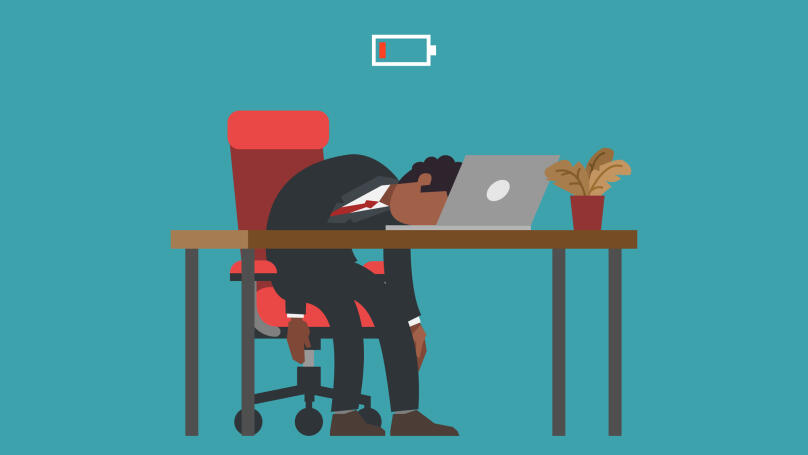
The most susceptible to this disorder are employees who communicate with people or experience nervous tension constantly. It is believed that among the professions most prone to professional burnout are doctors, teachers, lawyers, company leaders, psychologists, and sales managers. According to polls, 43% of managers, 40% of workaholics, 35% of "creative individuals", and only 5% of newcomers to a new field of activity suffer periodically from emotional exhaustion and apathy.
Do you want to take a quick professional burnout test? Find your personality traits listed below. Did you find more than half? If so, you are at risk. The most prone to burnout are:
- Idealists and Perfectionists
- Introverts
- Vulnerable and empathetic people
- People who are susceptible to other people's criticism and negativity
- Emotional people
Reasons for professional burnout
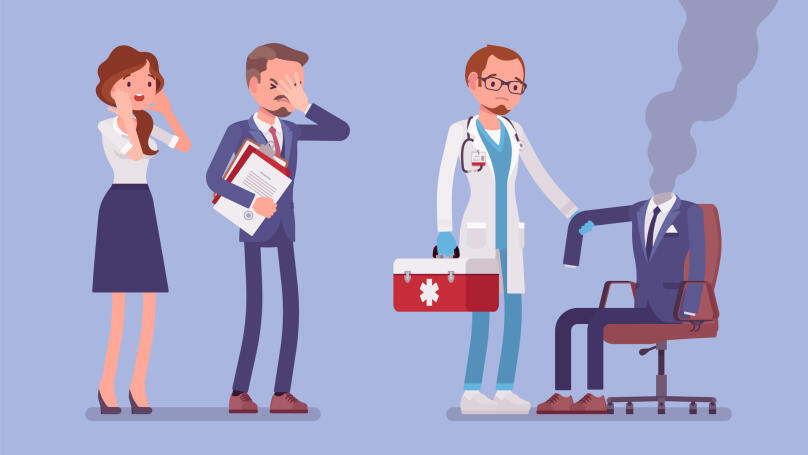
The most common causes of burnout, which were mentioned earlier, are supplemented by more than a dozen minor ones. For example, another reason for exhaustion of the nervous system is inactive communication "in one direction" (the interlocutor does not answer you or is hostile). A list of "additional" reasons can also include:
- Monotony of work, low self-organization
- Overloaded with tasks (or lack of these tasks)
- Unhealthy atmosphere
- Low wages
- Lack of career development coupled with lack of motivation
- Constant change of managers
- Constant change of job duties
You can diagnose professional burnout yourself. Check which items describe your situation and compare your results with the rapid test. Did you check more than half of the boxes? Then you are in the early stages of burnout. What if almost all of the items are checked? Skip ahead to the section on first aid measures!
How to identify burnout
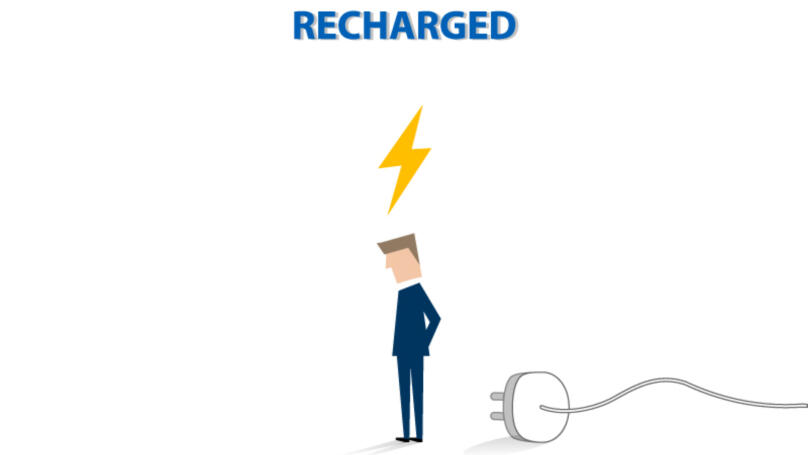
Burnout symptoms are generally divided into three "blocks":
Psychophysical. Severe and persistent fatigue, decreased energy, exhaustion, lack of curiosity, fear, insomnia, headaches, drowsiness, blurred vision, and weight fluctuations.
Socio-psychological. Nervous breakdowns, signs of depression, apathy, anxiety for no reason, irritation, confidence in the lack of prospects, and decreased self-esteem.
Behavioral. Feeling the senselessness of work, being in a stupor, the inability to complete tasks, strong distance from the team, lack of motivation, violating the daily routine and being late, the inability to make a decision, and the emergence of bad habits.
Stages of professional burnout
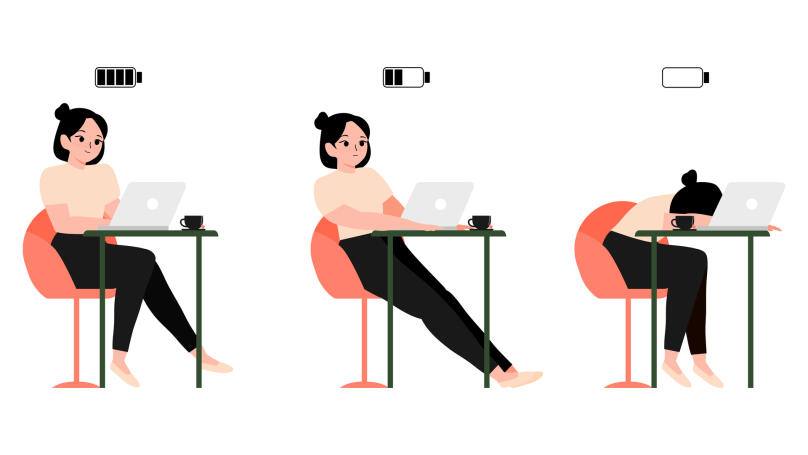
There are three stages, each of which has its own characteristics. We consider each of these stages and give a brief description of the state of a person who is in one of these phases of burnout.
First stage. You forget individual words, terms, and facts. You constantly make mistakes with your words and mistype them. This stage takes from three to five years to develop, depending on the degree of stress and individual characteristics of the person.
Second stage. You are no longer interested in work. You have no need for communication. You are dissatisfied with yourself and those around you. You start to feel apathy more and more often. You may complain of a headache and be constantly annoyed, but rarely tell others about your condition. This stage can develop between five and fifteen years.
Stage Three. This is where the signs of professional burnout manifest themselves in all their glory. You lose any interest in work, and life in general. You feel that you lack vitality. You are emotionally devastated and prefer to carry out your job duties alone. You may even find yourself suicidal. This stage could take up to twenty years to develop.
How to overcome burnout

Methods of combating burnout (which is more suitable for the first stage, since the subsequent ones are almost impossible to "eradicate" on their own) are similar to preventive methods. In other words, if you want to overcome burnout, you should read the checklist for those who do not want to have it.
Pay attention to healthy, sound sleep - it's not only necessary on weekends, but also on weekdays. It is also important to notice moral exhaustion in time. This first manifests by stopping communication with colleagues and management, as well as not getting proper rest. We recommend that you do a sport that fits into your schedule and rhythm of life. You might also want to take a closer look at meditation.
What else can you do to cope with stress at the "amateur" level? You have to get rid of accumulated grievances, high expectations (including for yourself), fear and shame, internal aggression, unproductive envy, as well as feelings of guilt and self-pity. We know that this is difficult, but you will definitely be able to overcome the cause of each of these feelings. This will be the first step towards acceptance.
Prevention of professional burnout
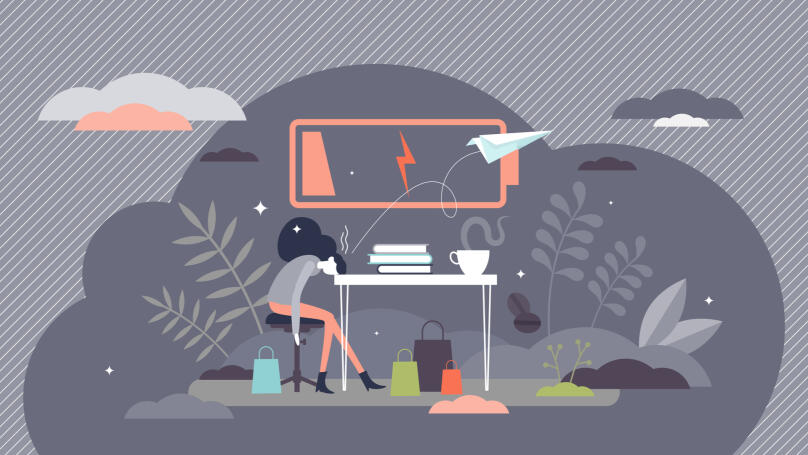
It is impossible to completely eliminate the possibility of burnout, but you can try to prevent it. In order to avoid this disorder we advise you to carefully choose the company in which you will work. Working conditions, motivation systems, staff rotation, and team building are also important. It should be clear to you what career growth you can count on, what responsibilities you must perform, when to expect an increase in wages, that some development awaits you and the company, etc.
How to avoid professional burnout if the place of work completely suits you?
- Take short breaks from work, switch your attention, and don't let stress ruin your mood.
- Reduce the importance of situations that are unpleasant to you by speaking to yourself and writing down what you think about it.
- Don't forget about physical activity. Do the minimum at least.
- And remember to get rest! Get away from your work after it's finished. Yes, it is easy to say and harder to do. Don't take your work home!
- If you are freelancing, learn how to manage your time correctly. Know how to postpone things. If necessary, delegate and work at a time convenient and suitable for your bio-rhythm.
- Take up the hobbies that you have been putting off forever.
- Take a few training sessions on effective negotiation. You can find free online and offline training in your city. This will help you build and manage effective communication, defend your own position, and competently convey your thoughts.
Burnout consequences: in brief

Burnout, if allowed to bring you down, can lead to loneliness and social isolation. Other consequences include:
- Onset of personality disorders or depression
- An increase in the number of conflict situations at work and in the family
- Decreased immunity, as well as pain and a general deterioration in health
- Decline in productivity and dismissal (as a result)
Almost anyone who has not reached the last stage can cope with professional burnout. Victory conditions are the desire to get out of this regressive state, the presence of at least some amount of free time, and the use of at least three or four of the techniques described above.
Share this with your friends via:
Latest News

In the UK, £23 million has been allocated for the expansion of the EdTech Testbed program — pilots of educational technologies in schools and colleges.

In the US, Tuskegee University announced the launch of Tuskegee University Global Campus (TUGC) — a new online platform for distance learning.

A significant stage in the development of the alternative education system has begun in West Northamptonshire in the UK: the County Council is actively calling on parents, guardians, and trustees to participate in shaping the future of this key area.

Outwoods Primary School in Atherstone, Warwickshire, having experienced deep sadness after the loss of their famous cat, Silla, has found solace in a new pet – a Maine Coon named Aloysius O’Hara.

In modern universities, artificial intelligence, and in particular ChatGPT, is rapidly transforming from a controversial tool into a full-fledged student assistant.












 Spring skills audit: what to remove, strengthen, and “sow” in learning
Spring skills audit: what to remove, strengthen, and “sow” in learning
 9 Career Mistakes Young Professionals Make
9 Career Mistakes Young Professionals Make
 £23 million allocated for the expansion of EdTech Testbed in the UK
£23 million allocated for the expansion of EdTech Testbed in the UK
 Test: How Psychologically Mature Are You? Check Your Inner Foundation.
Test: How Psychologically Mature Are You? Check Your Inner Foundation.
 Test. Check Your Social Media Dependency Level!
Test. Check Your Social Media Dependency Level!
 Test: What Business is Right For You?
Test: What Business is Right For You?
